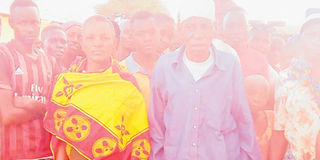Matonya speaks out after release

Mr Mganga Matonya poses for a picture with members of his family at his home village of Wiliko at Chamwino District in Dodoma Region on Monday. PHOTO| HABEL CHIDAWALI
What you need to know:
During an interview with The Citizen at his home village in Wiliko, Chamwino District, Dodoma Region, Mr Matonya confessed that he killed and that’s why he had been sentenced death.
Chamwino. Mr Mganga Matonya a.k.a Chigoma, one of the prisoners who were granted a pardon by President John Magufuli on Uhuru Day says he harbours a secret, which he would wish to reveal to the Head of State and that if he doesn’t get a chance to let it out, he would continue holding it.
During an interview with The Citizen at his home village in Wiliko, Chamwino District, Dodoma Region, Mr Matonya confessed that he killed and that’s why he had been sentenced death.
“Tanzanians should know that I surely killed and I ask God to forgive me. They, too, should forgive me,’’ he said.
At the age of, 85, Matonya is arguably the oldest of all prisoners who were set free on the president’s clemency on December 12.
He had served 43 years in jail at two prisons—Isanga in (Dodoma) and Mkono wa Simba in Morogoro.
Today, as he narrates his story, he seems to not come to terms with the reality that he is now set free.
He says, he never believed there was a single day in life when he would leave prison to live a normal life as a free person.
By the time he was set free, the father of 6 children and grandfather of 34, was serving jail at Mkono wa Simba prison in Morogoro Region.
“I killed. That was after I realised that the owner wasn’t ready to let his cows easily. My three colleagues and I stole 12 cows.”
“I was a thief,” he further confesses. “When I was a young man, I used to still a lot. But that day, I remember to have gone with a colleague, from the Massai tribe, and we stole the cows. It wasn’t easy to get them from the hands of the owner. We could have been killed too,’’ he recalls.
Matonya, who appears jolly, speaks of his life in prison. He says, “Prison life isn’t pleasant at all. There is no freedom. Prison wardens are working day and night. You see, the prison comprises people with diverse characters. It’s not easy to handle them,’’ he says.
He thanks his family for not abandoning him. “My wife and children used to visit me from time to time. This was so rewarding,’’ he says. His wish, for now, is to get an opportunity to advise the youth on the dangers of theft. “Theft doesn’t pay at all. It deters one’s development.’
He is asking the government and other stakeholders to help him boost his life, and get where to start from, after 43 years in prison.
He has vowed not to repeat his mistakes. Now he wants to engage in farming. “I am looking forward to the rains this season so that I can farm and get food for my family.”
Uhuru day with a surprise
That day, when it was announced that he had been set free, had begun like a normal day. ‘I was lying under a tree as other prisoners were watching television,’’ he recalls.
“Then, one prisoner came to me and said my name was mentioned among the people who would be freed.
I couldn’t believe him. I had to ask for the second time to confirm. Later, the prison wardens called us and suggested we prepare ourselves to leave prison. It was as if I was dreaming.’
Facing life outside prison
Matonya sees a changed village—different from the one he had left behind. “I left big trees, now it’s different. I never used to see the Sun rise from that side. The World has changed very much.”




